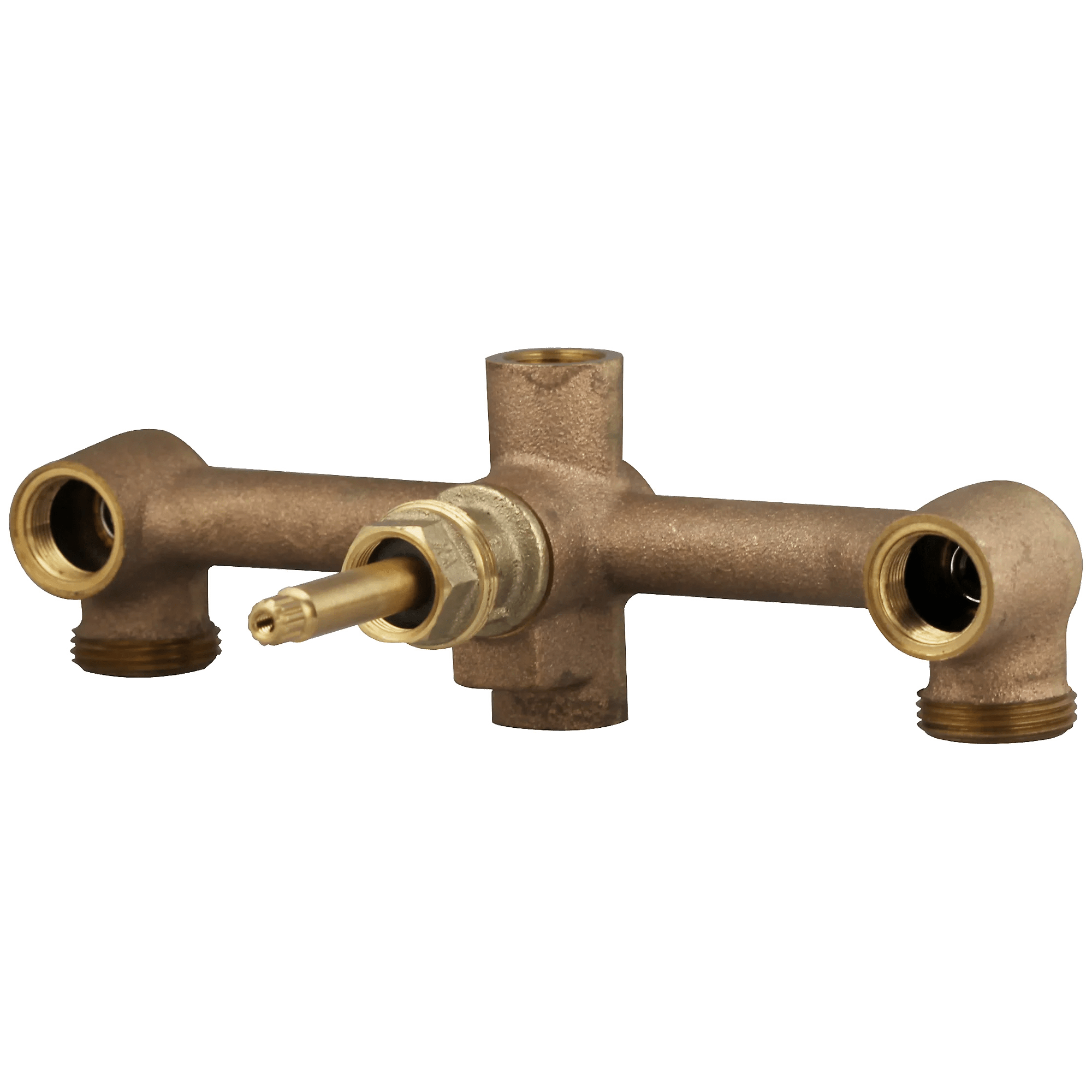Conquering the Dual-Handle Shower Diverter Beast
Ever stood shivering in a cold shower, desperately twisting knobs, praying for a burst of warmth? The two-handle shower faucet with diverter: a ubiquitous bathroom fixture, yet often a source of bewilderment. We're diving deep into this plumbing puzzle, exploring its history, function, and the occasional quirks that can leave you drenched in frustration.
The double-handled shower control, complete with its flow-diverting mechanism, isn't exactly a recent invention. These fixtures have been around for decades, offering separate control over hot and cold water – a stark contrast to the single-lever mixing valves that are gaining popularity. But the classic two-handle design remains a common sight, particularly in older homes, and understanding its nuances can save you from a chilly (or scalding) surprise.
So, what exactly is a diverter valve in this context? It's the ingenious little component that directs the water flow either to the showerhead or to the tub spout. This seemingly simple mechanism is the key to a satisfying shower experience, allowing you to switch between a relaxing soak and an invigorating spray. But like any mechanical device, diverters can sometimes malfunction, leading to drips, leaks, or a complete refusal to cooperate.
Imagine stepping into your shower, expecting a warm cascade, only to be met with a pathetic trickle. Or worse, picture water gushing from both the showerhead and the tub spout simultaneously, creating a watery chaos. These are just a few of the common woes associated with two-handle shower faucets and their sometimes temperamental diverters. Fear not, though, because understanding the inner workings of these fixtures can empower you to troubleshoot problems and even perform simple repairs.
From leaky diverters to stubborn handles, we'll unpack the common issues plaguing these bathroom staples. We'll explore the benefits of two-handle systems, delve into the different types of diverters, and even provide a step-by-step guide for replacing a faulty valve. Get ready to transform from a frustrated shower-taker into a plumbing pro!
Early shower controls were often rudimentary, lacking the precision of modern diverters. The evolution of these mechanisms has led to more reliable and efficient water flow control. The importance of the 2-handle shower diverter faucet lies in its separate hot and cold water controls, giving the user precise temperature regulation. However, a main issue is the potential for scalding if the hot water supply fluctuates.
A two-handle shower faucet with diverter consists of two separate handles for hot and cold water, and a built-in valve that diverts the water flow between the showerhead and tub spout. A simple example is turning the diverter knob to direct water upwards to the showerhead.
Benefits of a 2-handle shower faucet with diverter include independent temperature control, allowing for precise water temperature adjustment; classic design, adding a traditional aesthetic to bathrooms; and durability, as these faucets are often made with robust materials.
Advantages and Disadvantages of 2 Handle Shower Faucets with Diverter
| Advantages | Disadvantages |
|---|---|
| Precise Temperature Control | Potential for Scalding |
| Classic Design | Can be less convenient than single-handle faucets |
| Durable Construction | Diverter valves can be prone to leaks |
Best Practices:
1. Regularly check for leaks around the handles and diverter.
2. Clean the faucet regularly to prevent mineral buildup.
3. Don't force the handles or diverter knob.
4. If replacing the faucet, ensure compatibility with your plumbing system.
5. Consider water-saving showerheads for increased efficiency.
FAQ:
1. Why is my shower diverter leaking? (Possible causes include worn-out O-rings or a damaged valve.)
2. How do I replace a shower diverter? (This usually involves turning off the water supply, removing the handle and diverter stem, and installing a new one.)
3. Can I upgrade my showerhead with a 2-handle faucet? (Yes, but ensure compatibility.)
4. What are the different types of shower diverters? (There are push-button, pull-up, and rotating lever diverters.)
5. How can I fix a stuck diverter? (Try lubricating it with WD-7 or penetrating oil.)
6. What is the average lifespan of a shower diverter valve? (Typically 5-10 years.)
7. How do I prevent limescale buildup on my shower faucet? (Regular cleaning with vinegar or a descaling solution.)
8. Are there water-saving options for 2-handle shower faucets? (Yes, consider low-flow showerheads and aerators.)
Tips and Tricks: When turning the diverter, apply firm but gentle pressure to avoid damage. Regularly inspect the faucet for any signs of wear and tear.
The two-handle shower faucet with diverter, while a classic fixture, presents both advantages and challenges. Its ability to provide precise temperature control and its timeless aesthetic appeal are undeniable. However, potential issues like leaks and scalding risks require attention. By understanding the intricacies of these faucets, from their internal mechanisms to proper maintenance procedures, you can maximize their benefits and minimize potential problems. Embracing best practices, such as regular checks for leaks and mindful handling of the diverter, ensures a long lifespan for your faucet. Ultimately, mastering the art of the two-handle shower diverter translates to a more comfortable and enjoyable shower experience, putting you in control of your daily ritual of cleanliness and relaxation. Take the time to familiarize yourself with your specific faucet model and its maintenance requirements. A well-maintained two-handle shower faucet can provide years of reliable service, making your daily shower a truly refreshing experience.
Military passport express your guide to swift global access
The unexpected elegance of the diy punching bag
Manchester city vs real madrid witness the clash of european titans














